|
|
|
Sort Order |
|
|
|
Items / Page
|
|
|
|
|
|
|
| Srl | Item |
| 1 |
ID:
146501
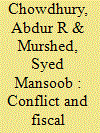

|
|
|
|
|
| Summary/Abstract |
We examine the role of war in retarding state fiscal capacity in developing countries, measured by tax revenue ratios to GDP. We build a simple theoretical model of a factionalized state, where patronage substitutes for common interest public goods, along with violent contestation over a rent or prize. Our dynamic panel empirical analysis applied to 79 developing countries, during 1980–2010, indicates that war, especially civil war, retards fiscal capacity, along with imperfect democracy, political repression, poor governance, and dependence on oil and macroeconomic mismanagement. High intensity conflict is particularly destructive of state capacity. In countries experiencing low intensity wars, other institutional factors may matter more than war. The diminution of fiscal capacity due to war appears less pronounced after the end of the cold war.
|
|
|
|
|
|
|
|
|
|
|
|
|
|
|
|
| 2 |
ID:
151709
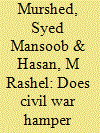

|
|
|
|
|
| Summary/Abstract |
We examine how armed conflict effects financial development in a cross-country setting using dynamic panel data analysis in a panel of 66 developing countries for the period 1985–2010. Financial development is measured by M2 as a share of GDP, and credit allocated to private sector by banks as a share of GDP. Our findings suggest that armed conflict has a significant adverse effect on financial development. Simultaneously, the quality of governance is always highly significant and conducive to the financial development. The quality of governance is more salient in determining financial development compared to low- and medium-intensity armed conflict; however, the quality of governance cannot entirely offset the adverse impact of high-intensity armed conflict on financial development.
|
|
|
|
|
|
|
|
|
|
|
|
|
|
|
|
| 3 |
ID:
117804
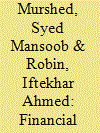

|
|
|
|
|
| Publication |
2012.
|
| Summary/Abstract |
This article explores the consequences of financial liberalization policy on the banking sector in Bangladesh. Following a motivating portfolio selection theor-etical model on the impact of liberalization, it applies time series techniques with annual banking sector data for the period 1981-2008. The study suggests that the main objective of financial liberalization to promote domestic private savings by raising real interest rates has not worked. No significant positive correlation is observed between domestic private savings and the real deposit interest rate.
|
|
|
|
|
|
|
|
|
|
|
|
|
|
|
|
| 4 |
ID:
184059
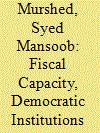

|
|
|
|
|
| Summary/Abstract |
The purpose of this paper is to gauge the various determinants of social sector spending captured by social protection and education spending in a cross section of developing countries, a subject on which there is scant empirical evidence. We hypothesize that fiscal capacity is necessary but not sufficient for resource allocation in this area, because the political will to do so must also be present. Using a panel data instrumental variable approach, we find that greater fiscal capacity robustly raises social spending in developing countries in the period 1990 to 2010. It is also strongly evident that rising democratisation enhances social sector spending; the presence of greater democracy and higher fiscal capacity could reinforce this effect. Our work also innovatively incorporates inequality into the analysis, finding that social expenditure is greater in more egalitarian societies. Military expenditure also appears to crowd out social protection expenditure, but not robustly.
|
|
|
|
|
|
|
|
|
|
|
|
|
|
|
|
| 5 |
ID:
126443


|
|
|
|
|
| Publication |
2013.
|
| Summary/Abstract |
This article investigates the military approach as a means of solving protracted civil conflicts, in particular focusing on the cases of Sri Lanka and Colombia in comparison. The approach adopted is to study the emergence of these military options within the context of each country's history and to assess whether the call for war was merely a consequence of the international 'war on terror', or driven by internal elements. The article explores the epistemological groundings and pitfalls of the all-out war theory informing this approach, before reassessing the significance and validity of the theory in relation to Sri Lanka and Colombia.
|
|
|
|
|
|
|
|
|
|
|
|
|
|
|
|
| 6 |
ID:
107886
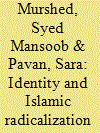

|
|
|
|
|
| Publication |
2011.
|
| Summary/Abstract |
This article argues that both socio-economic disadvantage and political factors, such as foreign policy of the West about the Muslim world, along with historical grievances, play a part in the development of Islamic radicalized collective action in Western Europe. We emphasize the role of group identity-based individual behaviour in organizing collective action within radicalized Muslim groups. Inasmuch as culture plays any role at all in radicalization, it is because individuals feel the imperative to act on the basis of their Muslim identity, something to which different individuals will attach varying degrees of salience, depending on how they place their Muslim identity-based actions in the scheme of their multiple identities. We also emphasize the role of the opportunistic politician, from the majority European community, in fomenting hatred for Muslims, which also produces a backlash from radicalized political Islam. We present comparative evidence of socio-economic, political and cultural disadvantage faced by Muslim minorities in five West European countries: Germany, the UK, France, Spain and the Netherlands.
|
|
|
|
|
|
|
|
|
|
|
|
|
|
|
|
| 7 |
ID:
098415
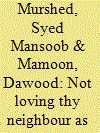

|
|
|
|
|
| Publication |
2010.
|
| Summary/Abstract |
This article analyses whether greater international trade, democracy and reduced military spending lower hostility between India and Pakistan. Conflict between the two nations can be best understood in a multivariate framework where variables such as economic performance, multilateral trade with the rest of the world, bilateral trade, military expenditure, democracy scores and population are simultaneously taken into account. The empirical investigation is based on time series econometrics from 1950- 2005, allowing causality to be examined. The results suggest that reduced bilateral trade, greater military expenditure, less development expenditure, lower levels of democracy, lower growth rates and less general trade openness are all conflict enhancing, albeit with lags in some cases. Moreover, there is reverse causality between bilateral trade, militarization and conflict; low levels of bilateral trade and high militarization are conflict enhancing, but conflict also reduces bilateral trade and raises militarization. Economic growth is conflict mitigating, but the reverse is not true. Globalization, or greater openness to trade with the rest of the world, is the most significant driver of a liberal peace, corroborating a modified form of the capitalist peace, rather than a common democratic political orientation suggested by the pure form of the Kantian liberal peace.
|
|
|
|
|
|
|
|
|
|
|
|
|
|
|
|
| 8 |
ID:
103182
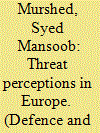

|
|
|
|
|
| Publication |
2011.
|
| Summary/Abstract |
This paper focuses on two aspects of insecurity for the European Union: domestic terrorism and international crime. In the former case, such as with radicalized Islam in the West, identity is crucial to the putative terrorist, solving the group's collective action problem. This paper models the strategic interaction between the government and a potential terrorist group. Space needs to be created so that Muslim migrants are able to merge their personal identities within their adopted European homelands and the socio-economic disadvantage faced by Muslims in Europe needs redressing. In addition, a macro-model is sketched of drugs production in a conflict-ridden developing country, where it is argued that demand-side policies of regulation may be superior to policies aimed at eradicating supply. Aid to fragile drug producing states should be broad-based and poverty reducing, not just benefiting warlords.
|
|
|
|
|
|
|
|
|
|
|
|
|
|
|
|
|
|
|
|
|